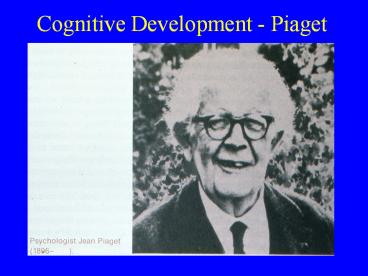Cognitive Development - Piaget - PowerPoint PPT Presentation
Title:
Cognitive Development - Piaget
Description:
Cognitive Development - Piaget Piaget Constructivism The belief that children actively create knowledge rather than passively receiving it from the environment. – PowerPoint PPT presentation
Number of Views:292
Avg rating:3.0/5.0
Title: Cognitive Development - Piaget
1
Cognitive Development - Piaget
- Piaget
2
Constructivism
- The belief that children actively create
knowledge rather than passively receiving it from
the environment. - Knowledge is constructed from experience
- Born with ability and desire to learn.
- Must be active to learn.
- Thinking/learning is internalization of physical
knowledge.
3
Adaptation
- Fundamental process by which schemes are altered
through experience. - Comprised of two complementary processes.
4
Mechanisms of Change
- Assimilation
information that fits
into existing cognitive
structure - schemas
5
Mechanisms of Change
- Accommodation
changing beliefs to
fit new conceptual
information
6
Equilibration
- Equilibration regulatory process that maintains
a functional balance between assimilation and
accommodation
7
Process of Equilibration
- Children are satisfied with mode of thought
(equilibrium) - Become aware of shortcomings in existing
knowledge (disequilibrium) - Adopt a more sophisticated mode of thought
(return to equilibrium)
8
Figure - Equilibration
9
Characteristics of Stages of Cognitive Development
- Each stage represents a qualitative change in
thinking - Culturally Invariant
- Includes structures and abilities of previous
stages
10
Stages of Cognitive Development
- Sensorimotor
- Preoperational
- Concrete Operational
- Formal Operational
11
Sensorimotor Stage
- Birth to 2 years of age
- Use senses, motor skills to gain knowledge
12
Piaget Object Permanence
13
Preoperational Stage
- 2 to 6/7 years
- Representational skills
- Egocentric thought
- Magical thought
- Animism
14
Concrete Operational
- 6/7 to 11/12 years
- Understand concrete problems
- Decentration
15
Conservation
16
Formal Operations
- 11/12 years through adulthood
- Logical and abstract thought
- Adolescent egocentrism Elkind
- Imaginary Audience
- Personal Fable
17
(No Transcript)
18
EVALUATION OF PIAGETS THEORYStrengths
- Children do move from being more egocentric to
less egocentric - Also move from being less systematic and able to
use logic to being better able to think in these
ways - Children do pass through stages in same order
- Constructivistic view of development
19
Criticisms of Piagets Theory
- Findings may only work with Piagets tasks
- Can have skills characteristic of two stages at
one time period
20
Criticisms cont.
- Not all reach formal operational stage
21
Postformal thought
- Characterized by recognition that
- 1) truth may vary from situation to situation
- 2) solutions must be realistic in order to be
reasonable - 3) ambiguity and contradiction are the rule
rather than the exception - 4) emotion and subjective factors usually play a
role in thinking
22
Themes
- Continuity vs. Discontinuity
- Nature vs. Nurture
23
Schaies Perspective on Adult Cognitive Changes
- Achieving stage (early adulthood)
- Responsibility stage (early to middle adulthood)
- Executive stage (middle adulthood)
- Reintegrative stage (late adulthood)
24
William Perry
- Adolescents dualistic thinking
- Young adults
- Multiple thinking
- Relative subordinate thinking
- Full relativism































